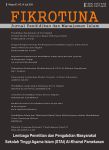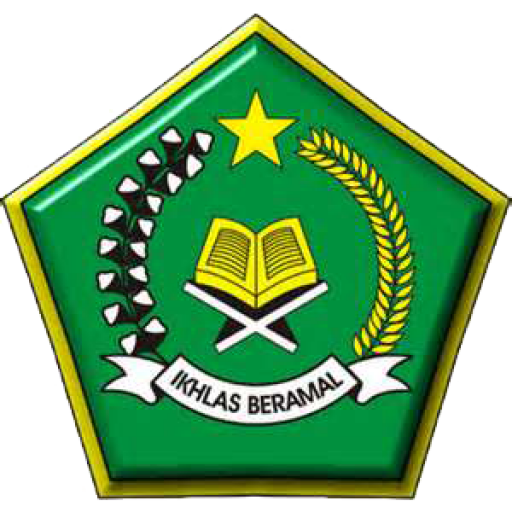Student’s Grammar Mastery of Simple Present Tense by Using Egra (Exposure, Generalization, Reinforcement, And Application) Method
DOI:
https://doi.org/10.32806/jf.v12i02.4166Kata Kunci:
Grammar, Simple Present Tense, EGRA methodAbstrak
Nowadays English send to be the crucial language in the world. The existence of English subject should be focus on the grammar. Because grammar stated as the complicated thing in English. This study focused on simple present tense, teaching English subject especially in simple present tense generally make students felt bored because they did not feel confidence and felt difficult in understanding the material. Here, EGRA method to be alternative of the problem in which the EGRA method can make make students more enthusiastically in learning and confident in simple present tense. EGRA is an acronym of four major learning styles for student’s confidence and confidence, namely Exposure, Generalization, Reinforcement, and Application. Many researcher found that teaching by using EGRA method give well understanding for students in learning a new language. It can be shown that students become more creative, active and communicative in the class. The success of learning also depend on the method used by the teacher. Here the EGRA method used to fulfill the needed of student.Referensi
Achmad Nurdianto. “The Effectiveness Of Using EGRA (Exposure, Generalization, Reinforcement, Application) Strategy Toward Students’ Achievement In Writing Skill Recount Text Of 8th Grade At Junior High School 2 Pakel.†State Islamic Institute (IAIN) of Tulungagung, 2019. http://repo.iain-tulungagung.ac.id/id/eprint/14096.
Angelianawati, L. “BEING AN ENGLISHTEACHER IN INDUSTRIAL REVOLUTION 4.0: AN OVERVIEW ABOUT ROLES, CHALLENGES, AND IMPLICATIONS.†Jurnal Dinamika Pendidikan (2019).
Argawati, Ningtyas Orilina. “THINK-PAIR-SHARE: ITS IMPLEMENTATION TO IMPROVE STUDENTS’ CAPABILITY ON UNDERSTANDING GRAMMAR ON THE SECOND SEMESTER STUDENTS OF STKIP SILIWANGI.†Jurnal JOEPALLT (Journal of English Pedagogy, Linguistics, Literature, and Teaching) (2017).
Fithriani, Rahmah. “COMMUNICATIVE GAME-BASED LEARNING IN EFL GRAMMAR CLASS: SUGGESTED ACTIVITIES AND STUDENTS’ PERCEPTION.†JEELS (Journal of English Education and Linguistics Studies) (2019).
Halimah, Halimah, Ninuk Lustyantie, and Gufran Ali Ibrahim. “STUDENTS’ PERCEPTION ON THE IMPLEMENTATION OF ORAI APPLICATION IN CLL METHOD IN TEACHING SPEAKING.†JEELS (Journal of English Education and Linguistics Studies) (2018).
Heryanti, Reni, Muhammad Hadi Sucipto, and Makmur Makmur. “THE ANALYSIS OF COMMON GRAMMATICAL ERRORS IN WRITING NARRATIVE ESSAY OF ENGLISH STUDY PROGRAM STUDENTS AT JAMBI UNIVERSITY.†Edukasi: Jurnal Pendidikan dan Pengajaran (2017).
Kumaravadivelu, B. Understanding Language Teaching: From Method to Postmethod. Understanding Language Teaching: From Method to Postmethod, 2005.
Kusumastuti, Mayang, Mega Pratiwi, and Hendra Husnussalam. “IMPROVING GRAMMAR SKILL USING EGRA TECHNIQUE FOR THE STUDENTS’ EIGHTH GRADE AT SMPN 5 CIMAHI.†PROJECT (Professional Journal of English Education) (2019).
Lin, Chi Jen, Gwo Jen Hwang, Qing Ke Fu, and Ya Han Cao. “Facilitating EFL Students’ English Grammar Learning Performance and Behaviors: A Contextual Gaming Approach.†Computers and Education (2020).
Lutfiansyah, Lutfiansyah. “Teaching Speaking to Senior High School Through Movie Discussion.†Scope : Journal of English Language Teaching (2018).
Munir, Syahrul, Emzir Emzir, and Aceng Rahmat. “The Effect of Teaching Methods and Learning Styles on Students’ English Achievement (An Experimental Study at Junior High School 1 Pasangkayu).†JETL (Journal Of Education, Teaching and Learning) (2019).
Nurjanah, Nurjanah, Doni Anggoro, and Nina Dwiastuty. “Error Analysis of the Use of Question Words in English Sentences.†Scope : Journal of English Language Teaching (2018).
Nurrahmatiah. “Improving the Students’ Grammar Ability Through EGRA (Exposure, Geberalization, Reinforcement, Application) Method Of The Second Year Students Of SMP Moncoloe Makassar.†UIN Alauddin Makassar Vol. 9 (2010).
Pangaribuan, Tagor, Elisa Haddina, and Sondang Manik. “The Students’ Error in Using Conjunction (Because, Since, as, in Case) in the Sentences.†English Language Teaching (2018).
Pilu, Reski, Hardianto, and Ardhy Supraba. “The Effectiveness of EGRA ( Exposure , Generalization , Reinforcement , Application ) Method in Teaching.†Jurnal Studi Guru dan Pembelajaran (2020).
Royani, Seli, and Sari Sadiah. “AN ANALYSIS OF GRAMMATICAL ERRORS IN STUDENTS’ WRITING DESCRIPTIVE TEXT.†PROJECT (Professional Journal of English Education) (2019).
Siswoyo, Siswoyo. “Students’ Error in Using Simple Present Tense Mastery.†English Education: Jurnal Tadris Bahasa Inggris IAIN Raden Intan (2016).
Sugito, Sugito, Sri Mulyani Endang Susilowati, Hartono Hartono, and Supartono Supartono. “Enhancing Students’ Communication Skills through Problem Posing and Presentation.†International Journal of Evaluation and Research in Education (IJERE) (2017).
Taslim, Fadilla. “Improving Students’ Mastery on Simple Present Tense Through Climbing Grammar Mountain Game.†Al-Ta lim Journal (2016).
Yildiz, Mustafa, and Mufit Senel. “Teaching Grammar through Task-Based Language Teaching to Young EFL Learners.†Reading Matrix: An International Online Journal (2017).
##submission.downloads##
Diterbitkan
Cara Mengutip
Terbitan
Bagian
Lisensi
Hak Cipta (c) 2020 FIKROTUNA

Artikel ini berlisensi Creative Commons Attribution-NonCommercial 4.0 International License.







